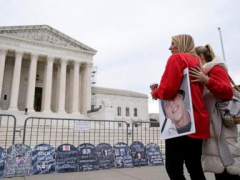NEW YORK — Lawyers representing OxyContin maker Purdue Pharma, branches of the Sackler family that own it, cities, states, counties, Native American tribes, people with addiction and others across the U.S. are expected to deliver a nearly unanimous message for a bankruptcy court judge Friday: Approve a plan to settle thousands of opioid-related lawsuits against the company.
If U.S. Bankruptcy Judge Sean Lane abides, it will close a long chapter — and maybe the entire book — on a legal odyssey over efforts to hold the company to account for its role in an opioid crisis connected to 900,000 deaths in the U.S. since 1999, including deaths from heroin and illicit fentanyl.
Closing arguments were expected Friday in the third day of a hearing over a bankruptcy plan for the company, which filed for protection six years ago as it faced lawsuits with claims that grew to trillions of dollars.
The saga has been emotional and full of contentious arguments between the many groups that took Purdue to court, often exposing a possible mismatch between the quest for justice and the practical role of bankruptcy court.
The U.S. Supreme Court rejected a previous deal because it said it was improper for Sackler family members to receive immunity from lawsuits over opioids. In the new arrangement, entities who don’t opt into the settlement can sue them. Family members are collectively worth billions, but much of their assets are held in trusts in offshore accounts that would be hard to access through lawsuits.
This time, the government groups involved have reached an even fuller consensus and there’s been mostly subdued opposition from individuals. Out of more than 54,000 personal injury victims who voted on whether the plan should be accepted. just 218 said no. A larger number of people who are part of that group didn’t vote.
A handful of objectors spoke Thursday at the hearing, sometimes interrupting the judge. Some said that only the victims, not the states and other government entities, should receive the funds in the settlement. Others wanted the judge to find the members of the Sackler family criminally liable — something Lane said is beyond the scope of the bankruptcy court, but that the settlement doesn’t bar prosecutors from pursuing.
A Florida woman who





